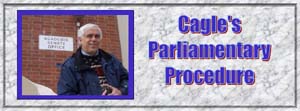
Link to Cagle's Questions page and index.
Link to Cagle's Parliamentary Procedure page.
Recording Voting in Minutes
l. Does secretary report in the minutes the number of Yes and No votes or just say the motion passed or failed?
2. Does secretary report who seconded a motion in the minutes?
3. Does secretary report a motion receiving a unanimous vote as approved unanimously or does she report it as approved or not approved?Unless there is a division of the house called for, the number of votes is not normally recorded in the minutes. Normally, neither the maker nor the seconder is recorded in the minutes.
The outcome of voting on a motion is recorded as approved or not approved (also in use: carried or not carried, MSC or MSF, passed or failed).
If it is desired to record in the minutes when a vote is unanimous, I advise that the chair should ask if there are any objections to the vote being recorded as unanimous. If there is even one objection, the vote should not be recorded as unanimous. While a vote of 1-0 with 14 abstentions is unanimous, in the context of having it recorded in the minutes as unanimous, some extra "power" is thought to be conferred on the motion by its not having any opposition.
There is a principle that a member may change his/her vote at any time before the final announcement of the vote and decision by the chair: "The motion received a majority, so the motion passes." Anyway, in my experience it is a good idea to assure that the entire membership at the meeting approves of giving the extra import to the vote on the motion.Thank you for your promptness in answering my questions. I am still unclear on my first question as to whether the number of yes and no votes on a motion should be included in the minutes. The assembly voting is a family of six. A motion I made to the group failed and I requested the exact number of votes for and against the motion be recorded in the minutes. Is this wrong and against parliamentary procedure? I'm not sure of the meaning of "Unless there is a division of the house called for." Please explain.
No numbers are included in the minutes unless there has been a formal division of the house. You only report whether the motion passed or failed to pass.
There is an Incidental Motion called Division of the House. Because it is the right of any member to request the division, the chair always automatically grants the request. It is not itself voted on (similar to a point of order, in this respect).
Parliamentary rules work best when everyone understands them before the meeting and everyone tries to follow them.
Routinely the votes for or against are not recorded in minutes. You would use a Division of the House motion to put the votes in the minutes.
Your family can decide on a policy to always put the number of votes on every motion into the minutes. While not the "default" rule, it would be also proper to do so.
I hope this additional information is helpful to you.
Approving Minutes
John:Our 5-member school board routinely approves prior meeting minutes at the next board meeting. Somehow, a practice was started and continues wherein if a member of the board were absent during a meeting, that member should abstain when voting to approve minutes of the meeting that member missed.
A new member wants to know why she shouldn't vote YES along with the others.
We cannot find anything in Oklahoma school law, but wondered if this idea arose from parliamentary procedures some years ago. Any clues or direction from Robert's Rules, etc.?
District Clerk
Lawton Public Schools
Lawton, Oklahoma 73507
All members can vote on the approval of the minutes. Remember you need a quorum to have a meeting (3) and the three people at that meeting would outvote even two people who weren't there and wanted to modify the minutes incorrectly.There is no requirement in parliamentary procedure that would have created your Board's practice, which is within their power to do. "Customs" of a group are very important in parliamentary law, so there is nothing wrong with it. I'm just saying it isn't a requirement in Robert's, but what is required is that members continue to have the right to vote on motions, even if they are absent from a meeting.
I hope this helps clarify things for you.
Return to Cagle's Questions page and index.
Link to Cagle's Parliamentary Procedure page.